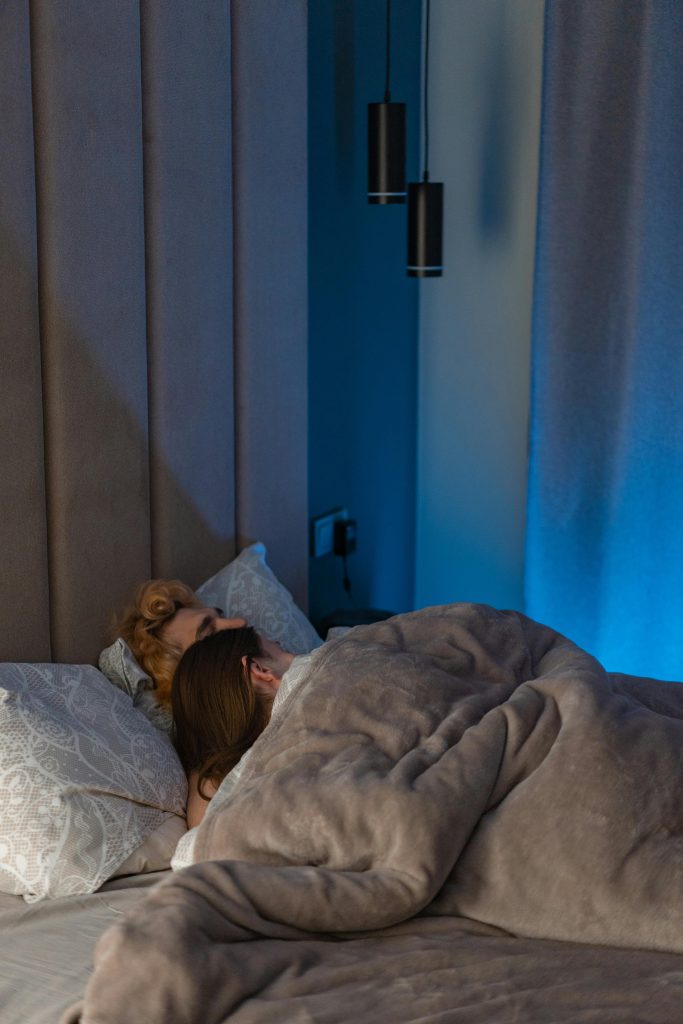Getting quality sleep is essential to improve sleep and ensure physical and mental health, yet many people struggle with restful nights. In today’s fast-paced world, poor sleep can affect your mood, energy, and productivity.

Fortunately, small changes to your routine and environment can make a big difference. In this article, you’ll find 8 proven strategies to help you sleep better and wake up refreshed.
1. How to Regulate Your Circadian Rhythm to Improve Sleep
The circadian rhythm is the biological clock that regulates the sleep-wake cycle. Keeping this cycle balanced is key to restorative nights. Some tips include:
- Sleep and wake up at the same time: This helps your body adjust and promotes deeper sleep.
- Expose yourself to natural light: Sunlight regulates the circadian rhythm, especially in the morning.
- Avoid blue light at night: Electronic devices emit blue light, which can disrupt melatonin production.
2. How to Create the Ideal Environment for Better Sleep
Your sleep environment plays a crucial role in the quality of your rest. Transform your bedroom into a relaxation sanctuary:
- Total darkness: Use blackout curtains or an eye mask to block out light.

- Silence or white noise: Earplugs or white noise machines can help mask external sounds.
- Cool temperature: Keep your room cool, ideally between 60°F and 67°F (16°C to 20°C).
- Comfortable bed: Invest in a good mattress and pillows that support your body well.
3. Relaxing Nighttime Routine: How to Prepare for Sleep
Preparing your body and mind for sleep is as important as the act of sleeping itself. Follow a consistent routine:

- Read a book: Opt for light reading and avoid electronic screens.
- Take a warm bath: It relaxes your muscles and helps reduce tension.
- Practice meditation or yoga: Light exercises help calm the mind.
- Avoid strong stimuli: Dim the lights, lower noise levels, and avoid intense activities before bed.
4. Diet and Drinks: What to Avoid for Better Sleep
What you consume before bed can directly impact your rest:
- Avoid caffeine and nicotine: Both are stimulants that can interfere with sleep.
- Eat a light dinner: Heavy meals can make digestion difficult and cause discomfort.
- Consider sleep-inducing foods: Include foods rich in tryptophan, like bananas, oats, and milk.
5. Techniques to Reduce Daily Stress
Stress is one of the biggest barriers to restorative sleep. Try these simple practices:
- Gratitude journal: Writing down positive things about your day helps clear your mind.
- Deep breathing techniques: Inhale through your nose, hold, and exhale slowly through your mouth.
- Limit worries: Write down pending tasks and thoughts to address them the next day.
6. Physical Activity and Sleep: How to Find Balance
Regular exercise is a great ally for quality sleep, but the timing and intensity matter:

- Exercise in the morning or afternoon: Intense evening workouts can disrupt sleep.
- Include stretches: A light stretching session before bed helps relax muscles.
- Avoid overtraining: Too much exercise can lead to insomnia and fatigue.
7. How to Prevent Naps from Disrupting Your Nighttime Sleep
Naps can be refreshing, but moderation is key to avoid harming nighttime rest:
- Limit to 20-30 minutes: This prevents you from entering deeper sleep stages.
- Avoid late naps: Ideally, nap before 3 PM.
8. When to Seek Professional Help to Improve Sleep
If these strategies don’t resolve your sleep difficulties, it might be time to seek help:
- Sleep apnea: Snoring loudly or waking up gasping could be a sign.
- Chronic insomnia: Regularly taking more than 30 minutes to fall asleep is a concern.
- Sleep disorders: Consult a specialist for a detailed evaluation.
Conclusion: Small Steps to Sleep Better
Improving sleep doesn’t require drastic changes. Simple adjustments to your routine and environment can have significant impacts. Every person is unique, and finding what works for you is a process of experimentation.
Enjoyed these tips? Share this article with someone who’s also looking to improve their sleep and reap the benefits of a healthier, more balanced life!
